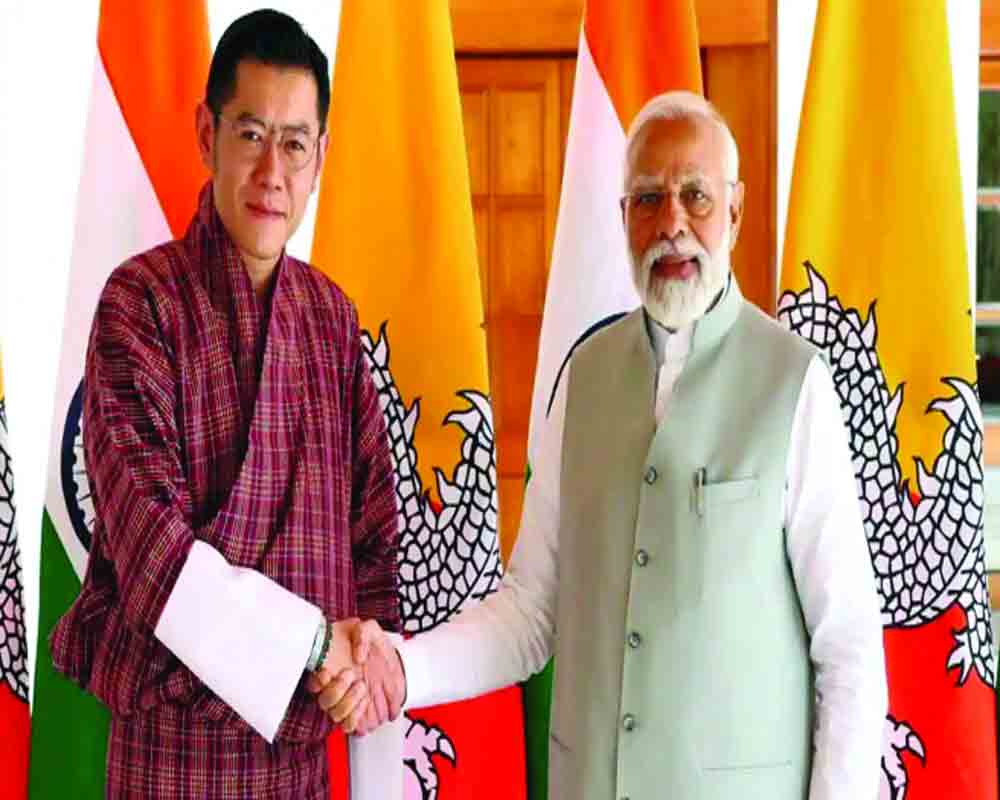Bhutan is important for India, especially after the Chinese aggression
Jigme Khesar Namgyel Wangchuck, king of Bhutan is on an official visit to India, a carefully timed bilateral engagement given the geopolitics of the region. Bhutan, a relatively small country sandwiched between India and China, acts as a buffer zone to growing Chinese aspirations of claiming territories through military might. India traditionally has warm relations with Bhutan but China in recent years has tried to push through with its opaque economic aides.
The joint statement released after the meeting of the king with the Indian Prime Minister stated the future cooperation across trade, technology, cross-border connectivity, mutual investments, education and people-to-people connections. The two sides agreed “To undertake the Final Location Survey (FLS), in consultation with the Bhutanese side, of the proposed cross-border rail link connecting Kokrajhar in Assam to Gelephu in Bhutan through GoI support. The two sides noted the successful completion of the Preliminary Engineering-cum-Traffic (PET) survey of the rail link by Indian Railways. The two sides also agreed to consider establishing a rail link between Banarhat (West Bengal) and Samtse (Bhutan). They agreed to designate Darranga (Assam)/Samdrup Jongkhar (Bhutan) as the immigration check post between Bhutan and India to facilitate the entry and exit of third-country nationals by land route for enhancing connectivity and promoting tourism.
The government of India assured to positively consider Bhutan’s request for concessional financing in the area of skill development and capacity building under the GyalSung Project. To increase trade access routes for Bhutan the countries designated the Haldibari (West Bengal) - Chilahati (Bangladesh) rail route as an additional trade route for Bhutan’s trade with Bangladesh.
To strengthen collaborative framework in environmental conservation, wildlife preservation, and forestry under the framework MoU for developing cooperation in the areas of environment, underscoring shared commitment to safeguarding the ecological diversity of the region. To allocate additional MBBS seats for Bhutanese students in medical colleges in Assam as an endeavour to ensure access to quality medical education and training for Bhutanese nationals. To double the outlay under the Ambassador’s scholarship for Bhutanese students pursuing higher education in India.” India’s interests in Bhutan are significant, especially after the Chinese aggression in the Doklam sector in 2017. Bhutan had allowed the Indian military to enter its territory to resist Chinese aggression. Doklam is strategic for India as it is near the Siliguri Corridor, which provides connectivity to India’s North East. China disputes Bhutan’s sovereign ownership of Doklam and has been aggressive in the region. China disputes several territories in Bhutan’s Western and Eastern borders and has similar claims over Indian territories in the North East.
India has managed to place itself strategically in Bhutan’s economic success roadmap. India is Bhutan’s largest trade partner however, imports from India into Bhutan exceed exports. This trade imbalance has been a cause of concern for Bhutan in the past and has requested India to provide greater access to its markets. Hydropower and clean energy cooperation form another pillar of the Indo Bhutan partnership and India has provided financial assistance and market access to energy generated from Bhutan’s projects. China, meanwhile has been deepening its diplomatic relationship with Bhutan, a fact not missed by India’s close ally US. US and Bhutan do not have direct diplomatic engagements. The US has a significant interest in the region, given the aggressive moves by China. India needs to deepen its relations with Bhutan while keeping the global powers informed about Bhutan’s concerns.
(The writer is a policy analyst, views are personal)
























